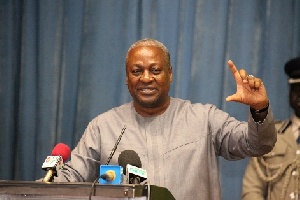President John Dramani Mahama on Wednesday reaffirmed government’s commitment to deal with corruption as investigations into financial scandals in the National Service Scheme were almost completed.
He said while 163 personnel had been dismissed, 33 officials of the scheme were being arraigned before court.
President Mahama said the Attorney General was also still reviewing cases on the Republic Versus Agbesi Woyome, Republic Versus Robert Azumah, Republic Versus Kweku Boadu-Asare and all issues in GYEEDA scandals.
President Mahama stated this when he addressed the second high level conference on National Anti-Corruption Action Plan (NACAP) in commemoration of International Anti-Corruption Day on the theme: "NACAP: Ghana United Against Corruption".
NACAP was established with the vision of creating a sustainable democratic society founded on good governance and imbued with high ethics and integrity.
It has the mission of contextualizing and mobilizing efforts and resources of stakeholders, including government, individuals, civil society, private sector and the media to prevent and fight corruption through the promotion of high ethics and integrity and the vigorous enforcement of applicable laws.
He said 10 persons who had been exposed by Investigative Journalist Anas Aremeyaw Anas in the cocoa smuggling investigation had been convicted.
He therefore urged Parliament to expedite Action on the Public Officers Conduct bill to enable the law to deal with corrupt public officials.
President Mahama called on development partners to respect the national systems of the country by avoiding undermining language that could misrepresent the country's image internationally.
On the corruption index placement that allegedly placed Ghana as the second most corrupt state in Africa, President Mahama said it was total falsehood that was spewed out for public consumption and called on the media to be circumspect in their reportage.
Mr Richard Quayson, acting Commissioner of CHRAJ said although his outfit was poised to fight corruption through various institutions, inadequate funding was hindering their progress.
He therefore appealed for more resources that would enable them to build the capacities of their committee members, Ministries, Departments and Agencies to fight corruption at all levels.
There were solidarity messages from the United Nations Secretary General and the United Nations Development Programme.
General News of Thursday, 10 December 2015
Source: GNA
Gov’t cracks the whip on corrupt public officials
Entertainment
















